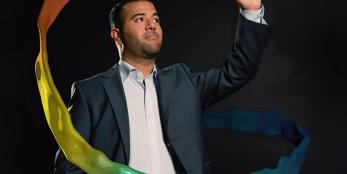From Cuisine to Experiments, Covestro Brings Science to Grandparents and Grandchildren Around Taiwan
A total of nine sessions across Taiwan, 324 participating grandparents and grandchildren, with a 1:4 teacher-to-student ratio
The theme of the first Covestro Grandparent-Grandchild science camp: “Grandma’s Magic Kitchen”
From cuisine to science, from food production to rocket launches, Covestro Taiwan’s Grandparent-Grandchild Science Camp with the theme “Grandma’s Magic Kitchen” bridged the gap between the elderly and science. It also allowed grandchildren to become closer to their grandparents and learn their daily wisdoms through experiments. This event attracted 524 enthusiastic registrations from grandparents and grandchildren, 324 of which were randomly selected by the computer. The oldest grandfather was 90 years old, and over 80% of the senior participants indicated that this was the first time they had conducted an experiment in their lives.
The seniors and children explored science magic in the kitchen and learnt about the possible physical and chemical reactions during food production at the camp today. Through a demonstration food experiment “Chinese sugar” (“椪糖”) they also learnt the key role that chemical reaction product carbon dioxide plays in this delicious snack. Carbon dioxide is also the secret weapon that the seniors used to make meat tender and delicious. The children were surprised to discover that their grandpas and grandmas are just like scientists when they are busy in the kitchen trying to find the best way to make delicious food for them. The lesson continued to guide the grandparents and grandchildren to make and launch soda rockets. The colorful density experiment helped them understand why some foods float in the hot pot while others sink to the bottom.
In order to help the grandparents and grandchildren learn with ease and achieve the goal of bringing them closer, the experiment is designed to be completed by a team of one grandparent and one grandchild. The activity book also shows image-based instructions with text for easier reading. In order to let the passion for learning sciece together be continued after the camp, extended experiments’ steps and instructions are also included in the activity book: the carbon dioxide lava lamp and the salt and water density Jenga tube.
“We are deeply honored to have the Golden Tripod Award-winner Professor Steve Hsu to design the program for us,” said Michael Lee, Managing Director of Covestro Taiwan. “The kitchen is indeed a fantastic science lab, and we hope that this fun activity will allow grandparents and grandchildren to discover that science magic is all around us. We also want to promote lifelong learning and create a fun and happy activity for grandparents and grandchildren and to bring them closer to each other.”
The camp is an extension of the Covestro MagicMaterial School and was desigened by Covestro’s science consultant, Professor Steve Hsu of the Department of Science Education and Application, National Taichung University of Education, and his team member Chen Wen-Ling also acted as the course instructor at the camp. In order to provide the grandparents and grandchildren with the best science experience, Covestro volunteers also attended the event as group Mandarin and Taiwanese bilingual advisors, with a 1:4 ratio of teachers to students.
The camp will be held at the locations of co-organizers in northern, central, and southern Taiwan in this January. The northern session was held today at the National Taiwan Science Education Center, while the Kaohsiung and Changhua sessions will be held at National Science and Technology Museum in Kaohsiung and Changhua Youth and Child Welfare Service Center respectively. The event is also supported by illustrator Chang Zhen-Fu who drew the main images for the camp.
About Covestro ‘MagicMaterial School’:
Since 2014, Covestro Taiwan launched MagicMaterial School, a science education program, in rural areas, and the scope of the activities has expanded to all the schools for the hearing-impaired in Taiwan since late 2016. The dynamic and interesting plays along with the STEM experiments are designed to integrate course subjects and help cultivate students’ interest in science. In addtion to the major events, Covestro Taiwan also established a longterm science club at Taichung Special School for Students with Hearing Impairments in 2018 and further developed “Grandparent-Grandchild Science Camp” in 2019. Professor Steve Hsu has been Covestro’s science education consultant since 2017 and advises on the designs of the activities’ experiments.
About Covestro:
With 2017 sales of EUR 14.1 billion, Covestro is among the world’s largest polymer companies. Business activities are focused on the manufacture of high-tech polymer materials and the development of innovative solutions for products that are used in many areas of daily life. The main sectors served are the automotive, construction, wood processing and furniture, and electrical and electronics industries. Other sectors include sports and leisure, cosmetics, health, and the chemical industry itself. Covestro has 30 production sites worldwide and employs approximately 16,200 people (calculated as full-time equivalents) as at the end of 2017.
Forward-Looking Statements
This news release may contain forward-looking statements based on current assumptions and forecasts made by Covestro AG. Various known and unknown risks, uncertainties, and other factors could lead to material differences between the actual future results, financial situation, development, or performance of the company and the estimates given here. These factors include those discussed in Covestro’s public reports. These reports are available at www.covestro.com. The company assumes no liability whatsoever to update these forward-looking statements or to make them conform to future events or developments.







